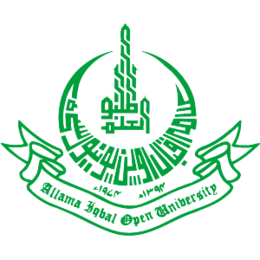Allama Iqbal Open University
| Allama Iqbal Open University | |
|---|---|
 | |
| Motto | Education for All |
| Established | 1974 |
| Type | Public |
| Chancellor | President of Pakistan |
| Vice-Chancellor | Dr. Shahid Siddiqui |
Academic staff | 2899 |
| Students | 1,326,266 |
| Location | Islamabad, Islamabad CT, Pakistan |
| Campus | Urban |
| Colours | Sky blue, Orange, White |
| Nickname | AIOU |
| Affiliations | HEC |
| Website |
www |
The Allama Iqbal Open University (popularly known as AIOU) is a public research university located in Islamabad, Pakistan.[1] The university is the fourth world's largest institution of higher learning, with an annual enrollment of 1,121,038 students (as of 2010), the majority of them women, and Course Enrollment of 3,305,948 (2011).[2][3]
Established in 1974, it is also Asia's first open university with a strong emphasis on providing distance education in engineering, law, philosophy, natural and social science.[4] It is considered the most attractive university in the country and has the most applicants per year.[5] The university offers extensive undergraduate, post-graduate, and doctoral programmes in various academic disciplines.[6] After witnessing the success of Open University in the United Kingdom, the university was established as a public university in 1974.[2]
It is regarded as one of the premier institutions of higher learning as well as research in the development of education and it is noted for its cost-effective policy to provide higher education at a minimum cost through a specialized university fund managed by the government.[2]
Administration and governance
- Chancellor (President of Pakistan)
- Pro-Chancellor (Federal Minister for Education, Ministry of Education)
- Vice Chancellor (Chief Executive Officer/Head of the institution)
- Executive Council (Governing Body)
Faculties and their departments
Faculty of Arabic and Islamic Studies
Established in 1974, the faculty has been upgraded as the Faculty of Arabic and Islamic Studies in 1998, with the following departments:
- Arabic Language and Literature
- Hadith and Seerah
- Islamic Law (Fiqh)
- Islamic Thought, History and Culture
- Quran and Tafseer
Faculty of Education
Established in 1984, the Faculty of Education's origin predates the university. A National Institute of Education was established in 1973 as a part of the Federal Ministry of Education, to improve education at school levels through in-service training of Master Trainers. This institute became a part of the university in June 1975. The Faculty of Education has the following departments:
- Adult and Continuing Education
- Distance and Non-Formal Education
- Educational Planning and Management
- Science Education
- Special Education
- Teacher Education (Secondary)
- Teacher Education (Elementary)
Faculty of Sciences
Renamed as Faculty of Sciences, the Faculty of Basic and Applied Sciences was established in 1982. It comprises the following nine departments:
- Agricultural Sciences
- Biology
- Chemistry
- Computer Sciences
- Engineering and Technology
- Environmental Sciences
- Home and Health Sciences
- Mathematics and Statistics
- Physics
Faculty of Social Sciences and Humanities
The Faculty of Social Sciences and Humanities was established in 1982. The thirteen departments of the faculty are:
- Business Administration
- Commerce
- Economics
- English Language and Applied Linguistics
- History
- Iqbal Studies
- Library and Information Sciences
- Mass Communication
- Pakistan Studies
- Pakistani Languages
- Sociology, Social Work and Population Studies
- Urdu
- Gender and Women's Studies
References
- ↑ google maps. "Location and address of AIOU". google maps. google maps. Retrieved 23 September 2013.
- ↑ 2.0 2.1 2.2 "Brief history". Brief history. Retrieved 23 September 2013.
- ↑ VC Annual Report 2009-10
- ↑ "Listing programmes". Listing programmes. Retrieved 23 September 2013.
- ↑ Siddiqui, Shoaib-ur-Rehman. "AIOU attracts large number of students". Wednesday, 18 September 2013 19:40. Business Recorder, Pakistan. Retrieved 23 September 2013.
- ↑ "Education programmes at AIOU". Education programmes at AIOU. Retrieved 23 September 2013.